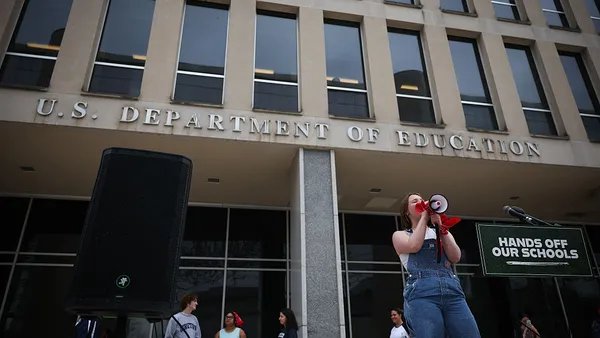UPDATE: June 24, 2022: The House passed the Senate’s amended version of the Keep Kids Fed Act on Friday morning. The bill now heads to President Joe Biden’s desk for signature.
Dive Brief:
- In a rare show of bipartisanship, the House voted 376-42 on Thursday to extend some pandemic-era school meal waivers through the next school year with passage of the nearly $3 billion Keep Kids Fed Act. But then late Thursday night the Senate sent the bill back to the House for another vote to account for changes made.
- During a House Education and Labor subcommittee hearing Thursday morning on the U.S. Department of Agriculture’s Food and Nutrition Service’s policies and priorities, legislators on both sides of the aisle expressed support for the newly proposed bill. While some lawmakers backed an extension of universal school meals — which is not included in the legislation — others said it’s time for the policy to end.
- Cindy Long, administrator of Food and Nutrition Service, urged the bill’s passage in testimony Thursday. She said the next school year would pose a challenging transition for school districts, which are facing fewer resources with the loss of pandemic-era meal waivers granted by Congress.
Dive Insight:
The clock is ticking as school nutrition waivers are set to expire June 30 and school nutrition directors brace for a world without assistance to address ongoing supply chain and labor shortage issues.
The House bill includes an extension to summer meal program waivers, a continuation of no-cost waivers like relaxed nutritional standards to help with supply chain disruptions, and an increase of federal reimbursement rates for school lunch by 40 cents and breakfast programs by 15 cents.
Under the original bill, students who are eligible for reduced-price meals would also receive free meals. However, Sen. Rand Paul, R-Kentucky, blocked the bill in the Senate, aiming to retain the reduced-price category within the federal school meals programs, NPR reported.
To be eligible for free meals under the original bill, families would once again have to file applications with school districts.
There was hope earlier this year that federal nutrition waivers would be extended within the fiscal 2022 spending bill, but that didn’t happen.
With the Keep Kids Fed Act’s exclusion of universal school meals, it appears a last-minute reprieve for the program may be out of reach. The universal school meal and other pandemic-era waivers expire in just six days, on June 30.
Bill sponsor Rep. Virginia Foxx, R-North Carolina, said on the House floor the bipartisan, bicameral Keep Kids Fed Act would help school meal programs return to “regular order.” Foxx is the ranking member of the House Education and Labor Committee.
Yet she offered no support for the extension of free school meals for all children, as backed by many child nutrition advocates.
“For over two years, Democrats used the permanent pandemic narrative to increase federal spending across the board, including within school meal programs. This has fueled inflation,” Foxx said. “This is not only irresponsible but ignores the narrow limits Congress purposefully placed on these programs. Congress never intended to provide universal free breakfasts and lunches to all K-12 students regardless of need.”
During the hearing, however, Rep. Ilhan Omar, D-Minnesota, called for a more permanent solution to child hunger by funding universal school meals.
When asked by Omar about the benefits of doing so, Long said the USDA has seen positive outcomes from such programs. Universal school meals are valuable in increasing meal participation as well as in reducing the stigma that arises from low-income children getting free meals while their more affluent peers pay for theirs.
Even though the immediate extension of universal meals is not foreseeable, FoodCorps President Rob Harvey said he is optimistic it will happen down the road.
“While we can’t predict the future, I tend to hold great hope that this is the beginning of a journey toward universal free meals for all students,” he said. “We stake our claim on the fact that what Congress has done [during the pandemic] should be permanent as both good political practices, but also just good moral practices.”
Without the Keep Kids Fed Act, Long said communities would be limited in the number of summer meal programs they could provide. If the current waivers had not been available during the pandemic, it would have been difficult for districts to provide meals to students at all, she said.
The bill would provide a “release valve of anxiety” for families worried about finding summer meals and help nutrition directors plan for the next school year, Harvey said.
However, he said without the continuation of universal school meals, districts are put in a position where they might have to trade off another pressing financial priority to continue a meal program for all their students.
“Not having waivers invites yet another set of decisions that school leaders will have to make around what it [the district] will pay for,” he said.















